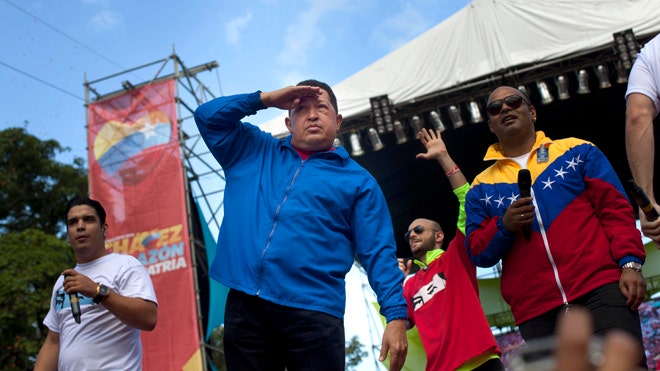'Vota por ti': The three words that can save Venezuela
By Diego Arria/Published October 06, 2012/FoxNews.com

Venezuela's President Hugo Chavez, front, gestures during a campaign rally in Maracay, Venezuela. (AP)
As this Sunday's presidential election in Venezuela looms, voters are daring to think the unthinkable: the fourteen year reign of Hugo Chavez may finally be coming to an end.
Credit for this groundbreaking change in attitude goes to one man-the opposition candidate Henrique Capriles. Capriles is a democrat who believes in the rule of law. I can personally attest to his good character and his heartfelt desire to change Venezuela for the better. I was at school with Capriles' father and I know the family well. Henrique may be only 40 years old, but he has the potential to be a great president.
Especially in the last few weeks, Capriles has enjoyed a remarkable surge in the opinion polls. These same polls show that around 20 percent of voters remain "undecided." When Venezuelans tick that particular box, it's because they are wary of confessing their voting intentions to a pollster, in case the Chavez regime fnds out and penalizes them. And that is precisely why the Capriles campaign can expect strong support from this particular pool of voters, who have the potential to swing the election in his favor.
What is Capriles' secret? A few weeks ago, I joined him for a public meeting in which he unveiled his plans-in the event that he is elected–for his first one hundred days in power. What struck me most was a short and simple phrase that he used. Asked by a journalist why Venezuelans should vote for him, he answered by saying that every ballot cast in his favor is a ballot in favor of the voter too. "Vota por ti," Capriles said. Or, in English: "Vote for you."
If an American politician uttered a phrase like this one, it might come across as a cheap ploy to win votes. However, in the Venezuelan context, those three words sing with hope.
Under Chavez, the Venezuelan people have been told to vote for revolution, not themselves.
Along comes Capriles, and we start to hear about policies that can make an actual difference to our lives. With the country groaning under the $140 billion of debt accumulated under the Chavez regime, Capriles emphasizes the importance of reforming our state-owned oil industry, which accounts for 95 per cent of our foreign export earnings. His message is that these revenues need to spent for the benefit of the Venezuelan people, instead of being wasted on the pet political projects of Chavez. These include giving free oil to Cuba and Nicaragua, buying arms from Russia, and cultivating alliances with brutal tyrannies like Iran and Syria.
Capriles has run a unique campaign which has involved going to the cities, towns and villages of this country to listen to the people directly. And here is what they have been telling him:
In the face of growing lawlessness, crime and gang-related violence, Venezuelans want security. Our murder rate, at 69 per 100,000, is the highest in the world. A Capriles administration will tackle the root causes of crime: lack of educational and career opportunities, the need for police reform, rampant corruption in the Chavez-controlled judicial system, and overcrowded, dangerous prisons that become incubators of crime rather than centers of rehabilitation.
In the face of growing impoverishment, Venezuelans want jobs and economic opportunities. More than 27 percent of Venezuelans live below the poverty line. A grave crisis in housing, frequent power cuts and even food shortages are established facts of life. Under Capriles, a strategy of economic reform will do away with the nepotism and corruption that has destroyed our economy.
In the face of a regime that regards itself as above the law, Venezuelans want their representatives to be governed by the rule of law. Freedom of speech and of the media is subject to the whims of Chavez and his cronies; private media outlets are fined, suspended and even closed down, while the government pushes it propaganda through its network of 244 radio stations and 36 TV channels. Under a Capriles presidency, Venezuela will benefit from democratic values, and not just democratic procedures.
Chavez knows that the message of Capriles is getting through. That is why he is responding with threats. “They (the opposition) are getting ready to cry fraud and reject the people’s triumph. I advise them not to dare,” Chavez barked at a recent rally in the city of Merida. This was a veiled reference to the militias that Chavez himself has armed, who may well play a similar role to that of the Basij militia in Iran when Chavez's good friend, the Iranian President Mahmoud Ahmadinejad, stole the 2009 election.
Which is why I say to the outside world, if Chavez decides he prefers bullets to ballots, you cannot say you were not warned.
Diego Arria is a former Ambassador of Venezuela to the United Nations, and chief spokesman of freevenezuela.org, an international campaign to support the Venezuelan opposition.
Read more: http://www.foxnews.com/opinion/2012/10/06/vota-por-ti-three-words-that-can-save-venezuela/#ixzz28VzU6qlD

No comments:
Post a Comment